By Carla Crowder, Executive Director
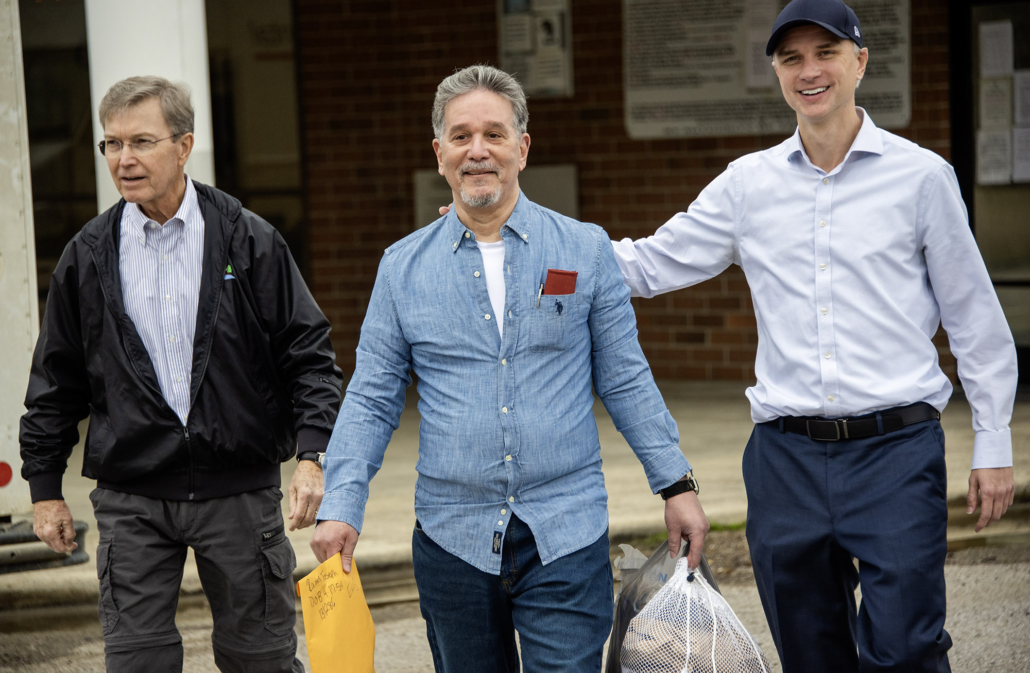
Joe Raines walks free for the first time in 43 years, accompanied by Appleseed Staff Attorney Scott Fuqua, and Rick Hudson, a leader in Hunter Street Baptist Church’s prison ministry program and board member at Shepherd’s Fold Reentry Ministry, where Mr. Raines resides. (photo credit Bernard Troncale)
Joseph Raines spent 43 years in Alabama’s prison system for a robbery conviction. At age 69, he was still working in St. Clair prison’s vehicle restoration plant, lifting heavy pieces of metal for $1 an hour when Appleseed took on his case.
Like most of our clients, Mr. Raines was serving life imprisonment without parole (LWOP) and was supposed to die in prison. On February 9, he walked free, enjoyed bacon at the Burger King in Springville, and slept in a peaceful, nonchaotic place for the first time in four decades.
Appleseed attorney Scott Fuqua served as lead attorney on the case, drafting the post-conviction petition that showed Mr. Raines’ LWOP sentence was excessive under current law; Jefferson County District Danny Carr did not oppose our efforts. There was no victim opposition either, as the conviction is so old the victim has passed away. Mr. Raines was resentenced to time-served by Jefferson County Circuit Judge Kechia Davis.
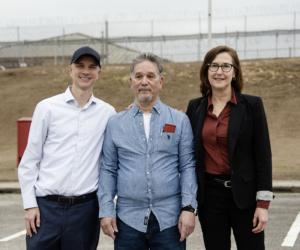
Joseph Raines with his attorneys, Staff Attorney Scott Fuqua and Executive Director Carla Crowder. (photo credit Bernard Troncale)
Appleseed lawyers were able to show that Mr. Raines demonstrated remarkable rehabilitation, despite his draconian sentence and having no reasonable hope for release. As one of his supervisors at St. Clair remarked: “I only saw politeness and a willingness to help others.”
It was shocking to him to be able to leave prison after so many years. “I was sitting in the car with Scott, and I said, ‘Am I really here?’” Mr. Raines said recalling those first moments as a free man. The surreal feeling continued as he walked into the bright morning lights of the Springville Burger King, “I just kept thinking, I am not here. This is not me,” he told me later. His other thought: “Do I deserve this?”
Working by age 8, homeless by 13
Because re-entry resources are threadbare in Alabama, Appleseed provides re-entry services to all of our legal clients, starting with ensuring they obtain the proper identification to move on with their lives. ID is critical for employment, housing, medical care, bank accounts and more.
But the only state-issued ID that Mr. Raines has is from the Alabama Department of Corrections identifying him as a recently released felon. He has never had a birth certificate, nor a social security card.
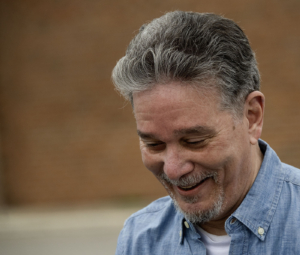
Joseph Raines on his release day. (photo credit Bernard Troncale)
We learned about his unusual background during early visits as we prepared his case and considered re-entry needs.
As Mr. Raines recalls, he was born in a trailer in Homestead, Florida. He was told his mother passed away due to an act of violence soon after his birth and his paternal grandmother took custody of him. Lacking a birth certificate, he did not attend school past kindergarten, and received little guidance, care, or support as a young child. He knew he was not wanted, but was too small to figure out where to go or how to take care of himself.
By the time he was 8-years old, he was wandering the dirt roads of the agricultural community where he lived and seeking out odd jobs. A farmer took pity on him and let him work in a produce-sorting barn. Sometimes Mr. Raines slept in the barn; none of his family checked on his welfare. That farmer also taught Mr. Raines how to drive, sending him on errands in a farm truck at a very young age. “He sort of took me under his wing,” Mr. Raines explained.
At 13, he hitchhiked to Miami, then found work as a flagman on a construction site in Daytona, Florida. He slept under a pier and kept his clothes in a bus station locker. There were jobs as a dishwasher, in construction, whatever he could find with his kindergarten education.
Throughout years of neglect, abuse, and just barely hanging on, Mr. Raines never once interacted with child welfare authorities, school officials, or any governmental agencies responsible for ensuring that children are not left to wander the streets with no education, resources, or care. His adventures took him from Virginia to California, and once involved reliance on a station wagon with no floorboards.
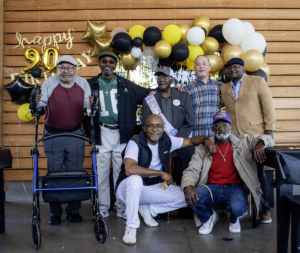
Joseph Raines with Appleseed clients (l to r) Robert Cheeks, Alonzo Hurth, John Coleman, Willie Ingram, Ronald McKeithen, and Lee Davis at Mr. Coleman’s 90th birthday party.
It was not until the inevitable occurred – hunger, need, and desperation led him to steal things, that law enforcement stepped in to punish and incarcerate him. It was in jail where he learned to read, with help from a pocket dictionary that a guard gave him.
In 1982, with a handful of out-of-state priors for minor offenses such as check forgery and theft, Mr. Raines was involved in a robbery at a Shop-A-Snack convenience store on Montclair Road in Birmingham. His gun never left his pants and he assured the clerk he was not going to hurt her. Mr. Raines was pulled over 6 days later in Flagstaff, Arizona and confessed to the robbery. He explained to the detective that he was trying to get back to his 3-year-old son in southern California and had robbed the gas station because he had no money for gas or means to earn it, according to testimony at his trial. Also at his trial, he acknowledged having at least three prior felonies, which resulted in the mandatory Life Without Parole sentence. He was 26.
For the next 43 years, a government that failed to provide intervention, care, or assistance to Mr. Raines as a neglected and homeless child found the means to imprison him for most of his life for crimes in which no one else was physically injured.
“I’ve tried to treat people better than I was treated.”
Every piece of Joseph Raines’ history adds up to a man who should be bitter and angry. Or at least hostile and wary. But this is not who he is at all.
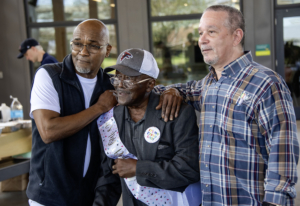
Joseph Raines with Re-entry Coordinator Ronald McKeithen and client John Coleman.
“I’ve tried to treat people better than I was treated,” he told us during one of our first visits with him at St. Clair. While incarcerated, he earned a GED, mostly avoided trouble and had been living in the honor dorm and worked in Alabama Correctional Industries for nearly 7 years.
Mr. Raines is open and easy-going. He asks for very little. Of course, he’s been somewhat overwhelmed by various aspects of the modern world. This is a man who had never before sat in front of a computer until February, 2024.
“To be honest, I’m loving every minute of it. I find a whole lot of stuff amazing. Walmart for one. I’ve never been in a store that huge.” Buying a mustache trimmer at Walmart made him happy. Walking out the door without having to tell anyone where he’s going makes him happy. “I enjoy the freedom of just being able to walk and throw a rock if I want to.” Currently, he resides at Shepherd’s Fold Reentry Ministry, but is looking forward to his own apartment.
One of his biggest challenges is that he wants to work and stay busy. But without a social security number, he cannot obtain employment, and without a birth certificate he cannot obtain a social security number.
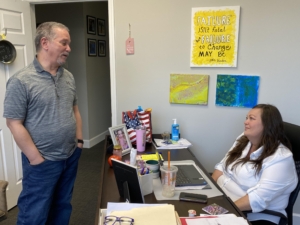
Joseph Raines with Appleseed Re-entry Case Manager Kathleen Henderson.
Appleseed’s re-entry case manager Kathleen Henderson has worked miracles with birth certificates before, proving our client Larry Garrett was indeed Larry Garrett, even though his birth certificate from Talladega County failed to include his actual name. Mr. Garrett is now joyfully employed as driving tractor trailers all over America for Western Express. For now, Kathleen is working every angle: genealogy experts, medical records, school records from 1960s rural Florida, brainstorming with the nicest people at the Social Security office.
Meanwhile, Mr. Raines stays hopeful, and has begun sharing his story with students and other groups. He enjoys spending time with one of his old friends from St. Clair, our client John Coleman, who was released in February, 2023 and just turned 90. They were housed in the same dorm for years, back when both men had been condemned to die in prison.
Despite all of this, his troubling childhood, his desperate youth, being incarcerated for two-thirds of his life in one of the country’s worst prison systems, Mr. Raines is upbeat.
“I was talking to Larry,” he shared. “I told him as soon as I’m able to get my ID, I’m going to enroll in the CDL class. If I can have seven to eight good years of driving, I can retire in peace.”
He certainly deserves that.






Leave a Reply
Want to join the discussion?Feel free to contribute!